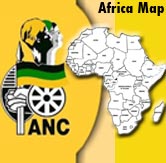Common touch, cash and cool key to landslide ANC victory
 Johannesburg - As the African National Congress (ANC) cruised to another overwhelming victory in South Africa's fourth democratic general election, the popularity of the ruling party of 15 years was being attributed to three main factors: the common touch, cash and cool.
Johannesburg - As the African National Congress (ANC) cruised to another overwhelming victory in South Africa's fourth democratic general election, the popularity of the ruling party of 15 years was being attributed to three main factors: the common touch, cash and cool.
Results from Wednesday's national and provincial elections showed the party's majority only slightly dented by the emergence of new opposition.
From a high of 70 per cent in 2004, the ANC's support, with over 80 per cent of the votes cast posted, had dipped slightly to a little over 66 per cent or the two-thirds it needs to push through constitutional amendments on its own.
Its nearest challenger, the liberal Democratic Alliance of Cape Town mayor Helen Zille was at 15.9 per cent, while the new Congress of the People (COPE) was stuck at around 7.5.
That Jacob Zuma's ANC would win the election had never been in question. With only half the votes counted the champagne was already flowing at an ANC victory party on the streets of Johannesburg Thursday night.
The only unknown had been the size of the ANC's majority.
A split in the party last year between factions aligned to Zuma and ex-president Thabo Mbeki, leading to the formation of COPE, had rattled the ANC as thousands of party members jumped ship.
Because COPE leaders, such as former ANC chairman and now COPE president Mosiuoa Lekota, could also claim the important mantle of the anti-apartheid struggle, analysts talked excitedly about the first credible opposition to the hegemonic ANC.
But COPE quickly lost momentum by failing to articulate a distinct vision, instead repeatedly attacking the ANC on issues like corruption that had already bedevilled the party under their man Mbeki.
In doing so, COPE neglected the bread-and-butter issues that most mattered to voters, such as unemployment of around 40 per cent.
Ironically, it was the ruling party that promised the most change. Energized by the COPE threat, the ANC went door-to-door promising more and better-paid jobs, improved healthcare, education and security.
Television ads, mass rallies and helicopters in party colours also added to an impression of ANC might that dwarfed the opposition.
The 97-year-old party also led in the hip stakes, with Zuma, a traditionalist who practises polygamy, emerging as the "daddy cool" of South African politics.
His trademark Umshini Wami (Bring me my machine gun) song became an anthem at rallies. Young supporters sported "ANC 4 LYF" (ANC for life in mobile phone language) t-shirts and ANC leaders took to Twitter.
COPE's campaign by contrast was dogged by cash problems. "It's a well-known thing here in South Africa that we became known as the party that doesn't have posters," COPE frontman, Methodist Bishop Mvume Dandala, joked on Thursday.
More important than the bucks and the bling was Zuma's ability to connect with ordinary people, according to Professor Sipho Seepe of the South African Institute of Race Relations.
"They see him as a representative of the great unwashed," Seepe says of Zuma, whose rise through the ranks despite being born into poverty, lacking formal education and being fired as deputy president in 2005 on suspicion of corruption in a state arms deal, has won admiration in many quarters.
The other winner in the election was the Democratic Alliance of Cape Town mayor Helen Zille. The liberal party of mainly white and mixed-race voters improved on its 2004 score of 12 per cent and prised free the ANC's control of Western Cape province.
Zille said the the score was a vindication of the party's "Stop Zuma" campaign. The DA had urged voters to erode the ANC's majority for fear Zuma might be tempted to tinker with the constitution. The ANC says it has no such plans. (dpa)